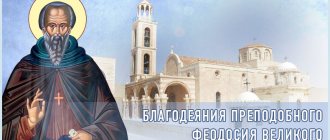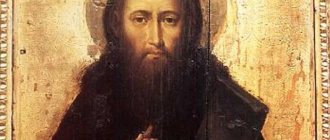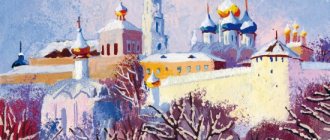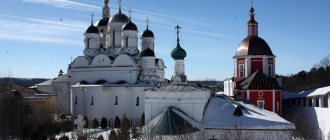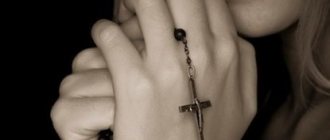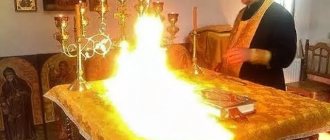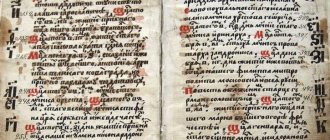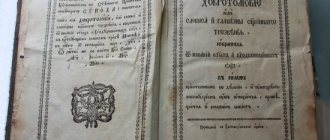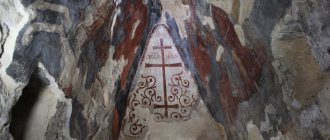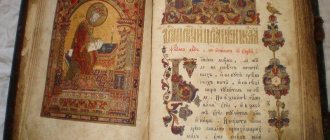Hermitage, temple and source of the venerable
The Hermitage of Theodosius of the Caucasus is located in the Gorny farmstead near Novorossiysk. There is a known spring here, which, according to legend, gushed out of the ground at the prayer of the elder and from which he asked God for miraculous power. In 2011, construction of a temple was completed in the desert. Pustyn belongs to the Novorossiysk diocese, source of St. Feodosia is listed on the diocese’s website as one of its shrines.
Chapel at the holy source of St. Theodosius of the Caucasus in the village of Gorny.
Despite the fact that Rev. Until now, Theodosius of the Caucasus has not been glorified for general church veneration; he is revered by many believers as an ascetic, confessor, and miracle worker.
Prayers to St. Theodosius of the Caucasus
First prayer
Oh, holy servant of God, Reverend Father Theodosius! You, who from your youth loved Christ and followed Him alone, withdrew to the Holy Mount Athos, to the inheritance of the Mother of God, and from there you flowed to the Holy Sepulcher. There he remained in holy orders for many years, and made fervent prayers for the Russian Land, for the Orthodox Church and for the Russian people. When the hard years of atheism befell Holy Rus', you left Athos and Jerusalem and returned to your Fatherland, sharing the grief and suffering of your people and our holy Church, as a monk and clergyman, even before imprisonment. Your faith, meekness, humility and patience touched the hardened hearts of those who were imprisoned with you.
During the years of war, Father, you helped the Orthodox people to overcome the enemy and adversary, and you saved many from despondency, grief and despair who wanted to end their lives. With your help, the faithful were strengthened in their hope that the Lord will not abandon our Fatherland, the Mother of God will preserve Her inheritance, and God’s wrath will be transformed into mercy by Her prayers.
Your difficult feat of Christ for the sake of foolishness surprised, father, not only us on earth, but also the inhabitants of heaven who appeared to you. This is what the prayer of a righteous person, aided by strong faith, can do.
You know our needs and sorrows, Reverend Father Theodosius, and you know our desire to be with Christ. Having walked the narrow and thorny path of earthly existence, you carried a heavy yoke from your brothers, from infidels and fellow tribesmen. Remember us, Elder of God, at the throne of the Lord, for you promised to help everyone who turns to you. The memory of you in the Caucasian land, father, does not fade to this day: with faith and hope, Orthodox people flock to your resting place, asking for intercession and help.
We ask you, Reverend Father Theodosius: help us in the difficult hour of life, in moments of sorrow and suffering, beg the Chief of the World, the Lord, that he will soften the evil and hardened hearts of men and pacify the peoples of the Caucasus. May the wicked councils of schismatics and heretics, rising up against the Russian Holy Church, be destroyed.
Through your prayers, Holy Saint of God, may the Lord forgive us all our sins, may the arrows of the enemy and the machinations of the devil pass us by. Ask the Creator and Provider of our Lord for time for repentance, deliverance from harm, health for the sick, restoration for the fallen, consolation for the sorrowing, education for children in the fear of God, good preparation for those departing for eternity, rest and inheritance for those who have departed.
Be, Father Theodosius, the patron and helper of all the faithful of the Caucasian land.
May Holy Orthodoxy be strengthened and multiplied there and throughout Great Rus'. We, strengthened by your holy prayers, will glorify the Life-Giving Trinity and your name, sanctified by God, now and ever and unto ages of ages. Amen. Second prayer
Oh, reverend and God-bearing Father Theodosius! Look upon us sinners who bring this prayer to you, and beg for us the Lord Jesus Christ and His Most Pure Mother, the Mother of God and the Ever-Virgin Mary, that we may be delivered by healing from various ailments of the flesh and spiritual, and ailments, and damage, and that we may receive from The Lord God forgives our sins, and acquires the Holy Spirit, the Life-Giving Lord, to help us fight against the enemy and guarantee the Kingdom of our Heavenly Father.
About Starch the mysterious and wonderful! Stretch out your prayer rod, so that with your prayers you will lead us from the mental wolves from hell of sins and lewdness, disobedience and our resistance, which we do every day and night, lewdness, as you are a strong intercessor before the Lord and the Queen of Heaven.
We pray to you, the living, and for the dead, as you snatch away the holy one from tartarus by the power of your prayers, so that they may be numbered among the right hand of the sheep of Christ our God.
Instruct us, holy fool Theodosius, to remember, in the knowledge of the Most Holy Trinity, the One Lord our God, merciful and saving, and the One Pure and All-Sung Mary the Virgin, our Sovereign Lady and Mother. May the Comforter remain with us through your prayers, to deliver us from all filth and make us partakers of the Kingdom of our Heavenly Father. Let us bow to Him, the All-Honorable and All-Desiring King, Creator and Lord our God, for He is Good and Lover of Mankind, and give glory, and extol His Most Honorable and Magnificent Name, the Father and the Son, and the Holy Spirit, now and ever and unto the ages of ages. Amen.
Life of an Elder
Feodor Kashin was born in the Perm province, his parents were peasants. The year of his birth is not known exactly; the years 1841, 1848, and 1862 are indicated. Biographical data about the first years of Theodore’s life is contradictory and fragmentary, but it is known that as a teenager he went to Athos. The abbot of the monastery (it is assumed that it was the Iveron Monastery, also called the monastery of the Position of the Belt of the Virgin Mary) did not want to accept the young man because of his age, but Theodore said that he was an orphan, after which he was accepted as a novice.
Useful materials
Some authors point out that while not yet a monk, at the age of 14, he performed his first miracle - he delivered the wife of a Russian dignitary from demonic possession. Since access to Mount Athos is prohibited for women, the novice went to the sick woman on the ship, taking with him the icon of the Mother of God. Through his prayers the woman was healed. The novice refused the reward, advising him to give the money to the abbot of the monastery.
Theodore accepted monasticism with the name Theodosius when he was 18 years old. Data on the monastic life of Theodosius on St. Mount Athos's grief is as contradictory as that of the early years of his life. Various sources contain information about the ambiguous attitude of the monastery brethren towards Theodosius: he often had to endure persecution, oppression, and once he was even thrown into a pit with manure.
Documentary sources contain only data about the “track record” of Father Theodosius, that is, about the obediences that he had to bear. Thus, it is known that in 1897 he was ordained a hieromonk.
Information about the further monastic path of Theodosius is again contradictory. According to the lives compiled by his admirers and spiritual children, and the authors who rely on these materials, the hieromonk served in Constantinople (Istanbul) at the monastery courtyard, then in Jerusalem, at the Holy Sepulcher. S. Devyatova in the book “Orthodox Elders of the 20th Century.” mentions that in Jerusalem Theodosius performed services in the national languages of the pilgrims who came to the temple, since he spoke several languages.
D. Orekhov, however, represents the ministry of Fr. Theodosius in a slightly different way: Russian pilgrims were forced to settle at Greek monasteries, where services were performed, of course, in Greek. But “fortunately, there were monks, both from Russia and from the Russian monasteries of the holy Mount Athos, who made it easier for their compatriots to meet the shrine.” One of these monks was Father Theodosius, who performed divine services in Slavic, which was familiar to pilgrims from Russia.
There is another vision of the ministry of Fr. Theodosius in Constantinople and Jerusalem. The monastery of the Position of the Belt of the Mother of God was not a full-fledged monastery, but a so-called cell, a small secluded monastery inhabited by only a few monks, of which there are quite a lot on Mount Athos even now. In this case, the departure of Fr. Theodosius to Constantinople looked like an attempt to set up a kind of cell courtyard in this city.
Such attempts were sometimes made by other Russian Kelliot monks, but these initiatives did not always receive the blessing of the hierarchy and support in their homeland, where, moreover, there was considerable pressure from the liberal public, universally dissatisfied with the Church and monasticism, as well as the leakage of funds to Athos: cells: poor monasteries often turned to their homeland for financial help and received it.
It was precisely the extreme ambiguity of the attitude towards the organization of “monasteries” of cells that apparently caused the scandal surrounding the ministry of Fr., which was reflected in the Greek and Russian press. Theodosius: it was regarded as an unauthorized arrangement of a monastery for a cell, which, not being a monastery, cannot have a monastery.
The scandal surrounding the unauthorized organization of the metochion, in accordance with the spirit of the times, was also joined by accusations of Theodosius of cohabitation with a certain girl Tatyana, who was preparing for monastic tonsure and was in close communication with her spiritual father, which received an appropriate interpretation. The accusations, however, were never proven. Apparently, the prevailing circumstances, difficulties in relations with the clergy - all this one way or another forced Fr. Feodosia to return to Russia.
At the beginning of the 20th century. (different sources indicate 1906, 1909, 1913) Theodosius visits his parents' house in the Urals, and then settles in the south of Russia (now Krasnodar Territory) in the village of Caucasus. He apparently lived here until 1917, after which he moved to the Gorny farm, 27 km from the city of Krymsk. In Gorny he founded a hermitage and built a small church.
Hieroschemamonk Theodosius of the Caucasus
Interesting fact
Pustyn had her own farm, an apiary, fully providing herself with everything necessary. According to the memoirs of spiritual children and admirers, Fr. Theodosius performed a significant part of the household work himself, despite his advanced age. He was often found at work by numerous pilgrims who came to him for advice and spiritual help.
For quite a long time, the Soviet government did not touch Fr. Feodosia - perhaps because, with the help of his spiritual children, he managed to organize a shelter for street children and lonely old people in the desert, and the fight against homelessness was one of the tasks of the authorities after the end of the civil war. Lives of Fr. Feodosius indicate that among his spiritual daughters was the wife of the “All-Russian headman” M.I. Kalinin, Ekaterina Ivanovna Kalinina, which could also have played a role, although this fact has not been confirmed, just as the data on the arrival of Kalinina. who allegedly personally gave permission to open the shelter and even the corresponding paper.
In any case, until 1927 the community existed calmly, and in 1927 the elder was arrested. He was convicted under the notorious Article 58 (anti-Soviet agitation and propaganda) and sent first to a concentration camp, then into exile, which he served until 1932.
Returning from exile, Fr. Theodosius settled in the city of Mineralnye Vody and took upon himself the feat of foolishness: he seemed insane, called himself “my uncle”, “Kuzyuk’s grandfather”, committed strange and inexplicable acts, which is why most people considered him “touched”, although harmless. According to surviving memories, “Kuzyuk’s grandfather” repeatedly helped people in crisis and critical situations.
For example, he gave money to a woman who had recently returned from prison and was unable to get a job, discreetly denouncing her for having thoughts of suicide:
“When the devil puts bad thoughts into the mind, the Lord speaks to my uncle and sends him to that house to ward off evil and the destruction of the soul.”
They told about an incident that happened during the Great Patriotic War, when “grandfather Kuzyuk” saved people from death in a kindergarten: during a walk he called the children and ran from them. Following the kids, the teachers ran out of the kindergarten - almost immediately after this the bombing began and the bomb destroyed the kindergarten, but the people who managed to leave the building a few minutes before the explosion remained alive and were not even injured. The elder also had the gift of healing.
During these years, the Russian Church experienced not only persecution from secular authorities, but also internal problems associated both with various kinds of schisms and with the reaction of the clergy and laity to the declaration of Metropolitan Sergius (Stragorodsky), which contained the recognition of Soviet power by the Church. A significant part of the clergy did not support the declaration and stopped commemorating Metropolitan Sergius at services.
According to a number of testimonies, Hieromonk Theodosius belonged to the number of such “non-rememberers”, which subsequently gave grounds for his special veneration by the so-called Catacomb Church (“True Orthodox Church”), as well as various kinds of speculation around the canonical and theological views of the elder . So, some authors believe Fr. Theodosius is not only “reminiscent”, but also an adherent of “name-glorification”, a movement that arose at the beginning of the 20th century. among Russian monks living on Mount Athos, the main theological postulate of which was the doctrine of the invisible presence of God in His Name.
The movement received mixed reviews in the church environment and was officially declared heretical by the Holy Synod. However, the commitment of Fr. Theodosius “name of glory” is not confirmed. Establishing the truth in these controversial issues was, of course, hindered by both accepted Fr. Theodosius’s feat of foolishness, which did not imply an open confession of faith, and in general the conditions of the time, persecution, pressure from the authorities, made it possible for an open presentation of theological positions.
Hieromonk Theodosius (Kashin) died in Mineralnye Vody in 1948, after the war.
Church of the Intercession of the Blessed Virgin Mary, Mineralnye Vody
The Church of the Intercession in the city of Mineralnye Vody was erected to replace the cathedral under the same name, which was completely destroyed during the years of Soviet power. Built by the whole world, this temple is now one of the main attractions of the Mineral Waters. The majestic Intercession Cathedral with nine domes surprises at the same time with its simplicity and canonical regular forms. Beautiful from the outside, it is also impressive from the inside with its magnificent decoration, four-tiered iconostasis and beautiful frescoes on the walls. The bells of the cathedral belfry sound very clear and beautiful.
Where are the relics located, address in Mineralnye Vody
Solemn service on the day of the celebration of the memory of St. Theodosius of the Caucasus
11
April
1995
On this day, the discovery of the relics of St. Theodosius of the Caucasus took place in Mineralnye Vody.
Now they are in the Church of the Intercession of the Blessed Virgin Mary at the address: Pyatigorskaya street, 35, Mineralnye Vody.
Day of Remembrance
August 8th Art. (26 July old style)
Miracles of our days
Both lifetime and numerous posthumous miracles of the saint are known, associated with the healing of the sick, help in everyday and spiritual matters, evidence of which is collected and recorded. As an example, we can cite the story of the posthumous miracle of St. Theodosius of Hieromonk Vasily Lukyanov, confessor of the Stavropol diocese, one of its oldest clergy:
“Wonderful are the deeds that saints can perform through faith in their gracious power. With such faith, Nadezhda Belozerova, a 62-year-old cleaner of St. Andrew’s Cathedral, received healing. She went as a pilgrim to the grave of Elder Theodosius. The trip was not easy. The bus broke down, then we went by a passing car. Arriving at the grave, the woman reverently bowed before the resting place of the great Elder and began to read an akathist to the Savior. After reading the akathist, she turned with deep faith to Saint Theodosius: “Father Theodosius, heal me!” Immediately she felt sick. She turned pale and could not stand on her feet. Sitting down on a bench, she began to call her companions for help. They were busy praying, but when they saw that Nadezhda was not feeling well, they approached her and gave her validol. Feeling that there was no benefit, the woman said: “I feel bad, I’m dying...”.
Then an old man suddenly appeared and said: “She needs to be given oil from the lamp of St. Theodosius.” Having poured the oil and sprinkled some soil from the grave into it, he gave it to the dying woman. As soon as she swallowed a sip of this oil, she felt better and felt completely healthy. It was as if nothing had happened to her. So, through the prayers of Elder Theodosius, Nadezhda Belozerova was cleansed, healed, and now with the fear of God she works in St. Andrew’s Cathedral.”
Hieromonk Theodosius (Poddubotsky)
Hieromonk Theodosius (Vladimir Sergeevich Poddubotsky) was born on June 19, 1979 in the city of Stupino, Moscow Region, into a family of employees.
In 1994, he graduated from high school in Stupino, Moscow region.
In 1997, Vocational School No. 52 in Stupino, Moscow Region.
From 2001 to 2011 studied at the Kolomna Theological Seminary and the Moscow Theological Academy.
On April 8, 2003, Abbot Gregory (Shchelkunov) at the KDS tonsured him into a mantle with the name Theodosius, in honor of the Venerable Martyr Theodosius (Bobkov) New Martyr Stupinsky.
On May 2, 2003, in the Church of All Saints in the Land of Russia, the City of Stupino, Moscow Region, Archbishop Gregory of Mozhaisk ordained him to the rank of hierodeacon.
On September 27, 2003, in the Assumption Church of the Novodevichy Convent, Metropolitan Juvenaly of Krutitsky and Kolomna was ordained to the rank of hieromonk.
In 2003, he was appointed to the staff of the Church of All Saints in the Russian Land of the Shining Ones in the city of Stupino, Moscow Region.
In 2003, he was appointed assistant dean of churches in the Stupinsky district.
In 2005, he was appointed rector of the Tikhvin Church in the city of Stupino, Moscow region.
In 2006 he was awarded the right to wear a leg guard.
In 2007, he was appointed part-time rector of the Znamenskaya Church in the village of Staraya Kashira, Stupino district, Moscow region.
In 2009 he was awarded the right to wear a pectoral cross.
In 2009, he was relieved of his duties as assistant dean of the churches of the Stupino district, rector of the Tikhvin church in the city of Stupino and the Znamenskaya church in the village of Staraya Kashira, Stupino district, and was enrolled in the brethren of the Boriso-Glebsky monastery in the city of Dmitrov, Moscow region.
In 2010, he was enlisted from the brethren of the Boriso-Gleb Monastery in the city of Dmitrov and appointed to the staff of the Anno-Conception Church in the city of Chekhov, Moscow region.
In 2013, he was appointed rector of the St. Nicholas Church in the village of Kulakovo, Chekhov district, Moscow region, remaining in his previous position.
In 2015, a letter of Blessed Metropolitan Juvenaly of Krutitsy and Kolomna.
Has church-wide and state awards:
2009 - Order of St. Vmch. Theodora Stratelates;
2010 - medal of the Department for Youth Work of the Russian Orthodox Church “Good Shepherd”;
2012 - Order of St. Theodosius of Chernigov UOC MP;
2015 – “GRATITUDE” from the Office of the State Road Safety Inspectorate of the Main Directorate of the Ministry of Internal Affairs of Russia for the Moscow Region. Chief of Police Major General V.V. Kuznetsov;
2015 – “DICATER OF HONOR” from the Main Directorate of the Ministry of Internal Affairs of Russia for the Moscow Region. Chief Lieutenant General V.K. Paukov
2016 – honorary medal “FOR VALORABLE LABOR” Moscow, Kremlin;
2016 – “GRATITUDE” from the Office of the State Road Safety Inspectorate of the Main Directorate of the Ministry of Internal Affairs of Russia for the Moscow Region. Chief of Police Major General V.V. Kuznetsov;
2016 – “GRATITUDE” BY THE DEPUTY MINISTER OF INTERIOR AFFAIRS OF THE RUSSIAN FEDERATION. Deputy Minister, Colonel General of Police A. V. Gorovoy;
2017 – Member of the PUBLIC COUNCIL. Ministry of Internal Affairs of the Russian Federation. Certificate: OST No. 001254. Main Directorate of the Ministry of Internal Affairs of Russia for the Moscow Region. Chief Lieutenant General V.K. Paukov;
2017 - “DICATER OF HONOR” from the Federal State Institution “Scientific Research Center for Road Safety Problems of the Ministry of Internal Affairs of the Russian Federation.” Chief of Police Major General O. M. Portashnikov;
2017 — “DICATER OF HONOR” from the Main Directorate of the Ministry of Internal Affairs of Russia for the Moscow Region. Chief Lieutenant General V.K. Paukov;
2018 – “GRATITUDE” from the FEDERAL AGENCY FOR NATIONALITY AFFAIRS. Head of the Federal Agency for Nationalities I.V. Barinov.
2018 — medal “FOR MERIT IN CULTURE AND ART” Chairman of the National Committee of Public Awards under the Government of the Russian Federation M. I. Sitnikov;
2019 - “DICATER OF HONOR” from the Public Council under the Main Directorate of the Ministry of Internal Affairs for the Moscow Region. Chairman of the Public Council at the Main Directorate of the Ministry of Internal Affairs of Russia for the Moscow Region, Major General L. M. Romanov.
